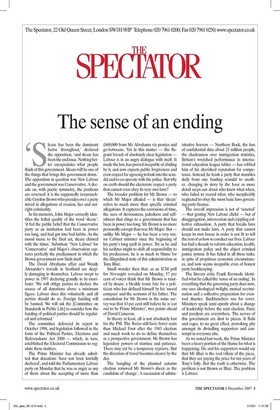The sense of an ending
'S leaze has been the dominant factor throughout,' declared the opposition, 'and sleaze has been the end issue. Nothing better encapsulates what people think of this government. Sleaze will be one of the things that brings this government down.' The opposition in question was New Labour and the government was Conservative. A decade on, with poetic symmetry, the positions are reversed: it is the supposedly irreproachable Gordon Brown who presides over a party mired in allegations of evasion, lies and outright criminality.
In his memoirs, John Major correctly identifies the lethal quality of the word 'sleaze': 'it fed the public belief that the Conservative party as an institution had been in power too long, and had got into bad habits. As the mood music to the final act, sleaze chimed with the times.' Substitute 'New Labour' for 'Conservative' and Major's observation captures perfectly the predicament in which the Brown government now finds itself.
The David Abrahams affair and Wendy Alexander's travails in Scotland are deeply damaging in themselves. Labour swept to power in 1997 declaring grandly in its manifesto: 'We will oblige parties to declare the source of all donations above a minimum figure: Labour does this voluntarily and all parties should do so. Foreign funding will be banned. We will ask the [Committee on Standards in Public Life] to consider how the funding of political parties should be regulated and reformed.'
The committee delivered its report in October 1998, and legislation followed in the form of the Political Parties, Elections and Referendums Act 2000 — which, in turn, established the Electoral Commission to regulate these matters.
The Prime Minister has already admitted that donations 'have not been lawfully declared', and told the Parliamentary Labour party on Monday that he was as angry as any of them about the accepting of more than £600,000 from Mr Abrahams via proxies and go-betweens. Yet in this matter — the flagrant breach of absolutely clear legislation — Labour is in an angry dialogue with itself. It made the law, has proved incapable of abiding by it, and now expects public forgiveness and even respect for agreeing to look into the scandal and to co-operate with the police. But why on earth should the electorate respect a party that cannot even obey its very own laws?
The broader problem for Mr Brown — to which Mr Major alluded — is that 'sleaze' refers to much more than specific criminal allegations. It captures the corrosions of time, the aura of deviousness, jadedness and selfishness that clings to a government that has been in power too long. Mr Brown is no more personally corrupt than was Mr Major. But — unlike Mr Major — he has been a very senior Cabinet minister since the beginning of his party's long spell in power. Try as he and his acolytes might to shift all responsibility to his predecessor, he is as much to blame for the dilapidated state of this administration as Tony Blair.
Small wonder then that, as an ICM poll for Newsnight revealed on Monday, 57 per cent of voters think that Mr Brown is tainted by sleaze: a bleakly ironic fate for a politician who has defined himself by his 'moral compass' and the sermons of his father. The consolation for Mr Brown in the same survey was that 43 per cent still believe he is 'cut out to be Prime Minister', two points ahead of David Cameron.
In theory at least, all is not absolutely lost for the PM. The Tories still have fewer seats than Michael Foot after the 1983 election and much work to do to define themselves as a prospective government. Mr Brown has legendary powers of stamina and patience. There may yet be a temporary reprieve. But the direction of travel becomes clearer by the day.
The bungling of the planned autumn election removed Mr Brown's sheen as the candidate of 'change'. A succession of administrative horrors — Northern Rock, the loss of confidential data about 25 million people, the cluelessness over immigration statistics, Britain's wretched performance in international education league tables — has robbed him of his cherished reputation for competence. Instead, he leads a party that stumbles daily from one funding scandal to another, changing its story by the hour as more detail seeps out about who knew what when, who failed to record what, who inexplicably neglected to obey the most basic laws governing party finance.
The overall impression is not of 'renewal' — that grating New Labour cliché — but of disaggregation, introversion and crippling collective exhaustion. A party that breaks laws should not make laws. A party that cannot keeps its own house in order is not fit to tell the rest of us how to conduct our lives. Labour has had a decade to reform education, health, immigration policy and the abject criminal justice system. It has failed in all these tasks, in spite of propitious economic circumstances, and now seems incapable even of honest party bookkeeping.
The literary critic Frank Kermode identified what he called the 'sense of an ending'. In everything that the governing party does now, one sees ideological twilight, mutual recrimination and a collective preparation for eventual disaster. Backbenchers run for cover. Ministers speak semi-openly about a change of leadership before the next election. Panic and paralysis are everywhere. The nerves of this government are shot to pieces. It flails and rages, to no great effect, provoking pity amongst its dwindling supporters and contempt in everyone else.
As we noted last week, the Prime Minister bears a heavy portion of the blame for what is happening. He and his supporters would say that Mr Blair is the real villain of the piece, that they are paying the price for ten years of Tony's folly. But the truth is otherwise. The problem is not Brown or Blair. The problem is Labour.

























































 Previous page
Previous page